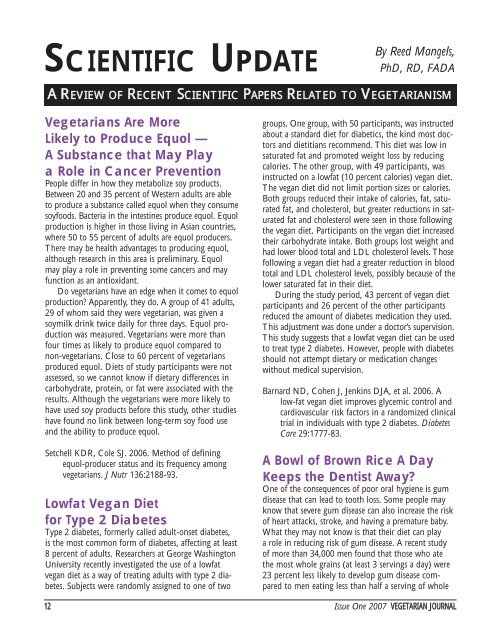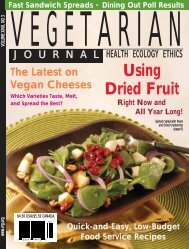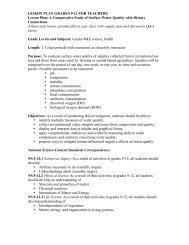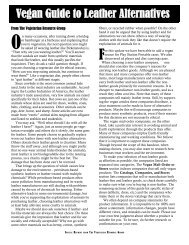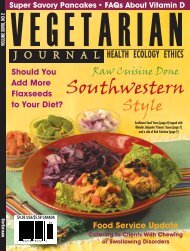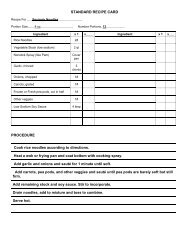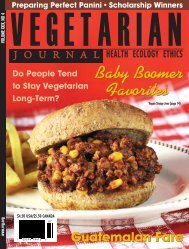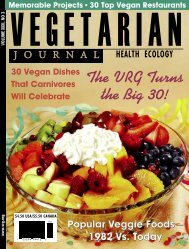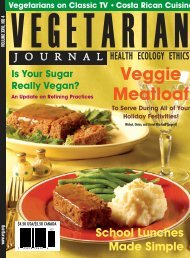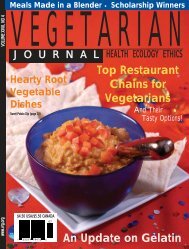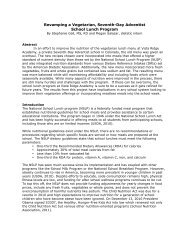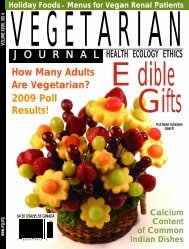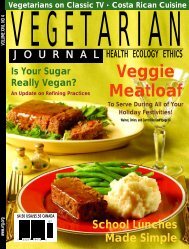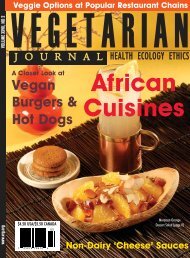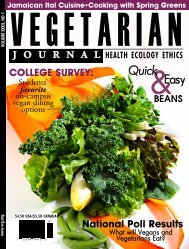Vegan Thickeners - The Vegetarian Resource Group
Vegan Thickeners - The Vegetarian Resource Group
Vegan Thickeners - The Vegetarian Resource Group
Create successful ePaper yourself
Turn your PDF publications into a flip-book with our unique Google optimized e-Paper software.
SCIENTIFIC UPDATE<br />
By Reed Mangels,<br />
PhD, RD, FADA<br />
A REVIEW OF RECENT SCIENTIFIC PAPERS RELATED TO VEGETARIANISM<br />
<strong>Vegetarian</strong>s Are More<br />
Likely to Produce Equol —<br />
A Substance that May Play<br />
a Role in Cancer Prevention<br />
People differ in how they metabolize soy products.<br />
Between 20 and 35 percent of Western adults are able<br />
to produce a substance called equol when they consume<br />
soyfoods. Bacteria in the intestines produce equol. Equol<br />
production is higher in those living in Asian countries,<br />
where 50 to 55 percent of adults are equol producers.<br />
<strong>The</strong>re may be health advantages to producing equol,<br />
although research in this area is preliminary. Equol<br />
may play a role in preventing some cancers and may<br />
function as an antioxidant.<br />
Do vegetarians have an edge when it comes to equol<br />
production? Apparently, they do. A group of 41 adults,<br />
29 of whom said they were vegetarian, was given a<br />
soymilk drink twice daily for three days. Equol production<br />
was measured. <strong>Vegetarian</strong>s were more than<br />
four times as likely to produce equol compared to<br />
non-vegetarians. Close to 60 percent of vegetarians<br />
produced equol. Diets of study participants were not<br />
assessed, so we cannot know if dietary differences in<br />
carbohydrate, protein, or fat were associated with the<br />
results. Although the vegetarians were more likely to<br />
have used soy products before this study, other studies<br />
have found no link between long-term soy food use<br />
and the ability to produce equol.<br />
Setchell KDR, Cole SJ. 2006. Method of defining<br />
equol-producer status and its frequency among<br />
vegetarians. J Nutr 136:2188-93.<br />
Lowfat <strong>Vegan</strong> Diet<br />
for Type 2 Diabetes<br />
Type 2 diabetes, formerly called adult-onset diabetes,<br />
is the most common form of diabetes, affecting at least<br />
8 percent of adults. Researchers at George Washington<br />
University recently investigated the use of a lowfat<br />
vegan diet as a way of treating adults with type 2 diabetes.<br />
Subjects were randomly assigned to one of two<br />
groups. One group, with 50 participants, was instructed<br />
about a standard diet for diabetics, the kind most doctors<br />
and dietitians recommend. This diet was low in<br />
saturated fat and promoted weight loss by reducing<br />
calories. <strong>The</strong> other group, with 49 participants, was<br />
instructed on a lowfat (10 percent calories) vegan diet.<br />
<strong>The</strong> vegan diet did not limit portion sizes or calories.<br />
Both groups reduced their intake of calories, fat, saturated<br />
fat, and cholesterol, but greater reductions in saturated<br />
fat and cholesterol were seen in those following<br />
the vegan diet. Participants on the vegan diet increased<br />
their carbohydrate intake. Both groups lost weight and<br />
had lower blood total and LDL cholesterol levels. Those<br />
following a vegan diet had a greater reduction in blood<br />
total and LDL cholesterol levels, possibly because of the<br />
lower saturated fat in their diet.<br />
During the study period, 43 percent of vegan diet<br />
participants and 26 percent of the other participants<br />
reduced the amount of diabetes medication they used.<br />
This adjustment was done under a doctor’s supervision.<br />
This study suggests that a lowfat vegan diet can be used<br />
to treat type 2 diabetes. However, people with diabetes<br />
should not attempt dietary or medication changes<br />
without medical supervision.<br />
Barnard ND, Cohen J, Jenkins DJA, et al. 2006. A<br />
low-fat vegan diet improves glycemic control and<br />
cardiovascular risk factors in a randomized clinical<br />
trial in individuals with type 2 diabetes. Diabetes<br />
Care 29:1777-83.<br />
A Bowl of Brown Rice A Day<br />
Keeps the Dentist Away?<br />
One of the consequences of poor oral hygiene is gum<br />
disease that can lead to tooth loss. Some people may<br />
know that severe gum disease can also increase the risk<br />
of heart attacks, stroke, and having a premature baby.<br />
What they may not know is that their diet can play<br />
a role in reducing risk of gum disease. A recent study<br />
of more than 34,000 men found that those who ate<br />
the most whole grains (at least 3 servings a day) were<br />
23 percent less likely to develop gum disease compared<br />
to men eating less than half a serving of whole<br />
12 Issue One 2007 VEGETARIAN JOURNAL


